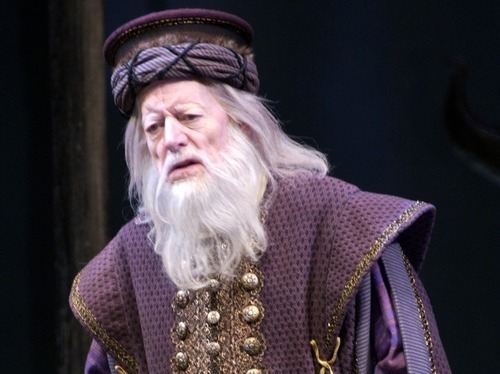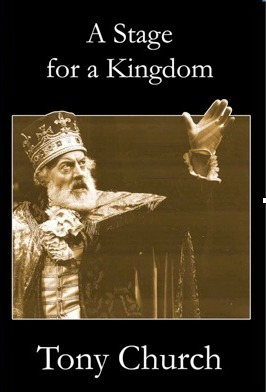Looking back at beloved Denver actor Tony Church as his memoir is released

Tony Church in what was to be his last appearance with the Denver Center Theatre Company, in 2004. But he became too ill and did not take the stage in “The Merchant of Venice.” Photo by Terry Shapiro.
British actor Tony Church was a respected member of the Denver Center Theatre Company and was the first dean of the National Theatre Conservatory. The “consummate man of theatre” died at age 77 on March 25, 2008.
Now his memoir, “A Stage for a Kingdom,” has been published, with an epilogue written by Patrick Stewart, currently starring on Broadway in “Waiting for Godot” and “No Man’s Land” in repertory. “A Stage for a Kingdom” costs $16 and is available as a paperback on Amazon.com (click here).
The book chronicles Church’s life from his earliest role – Grumpy in Snow White – to his final stage appearance at Stratford-upon-Avon in 2007. There is generous mention in the book of Denver Center Theatre Company members past and present.
He acted in 31 of Shakespeare’s 37 plays, which led me to refer to him as “Denver’s Baron of the Bard.”

By John Moore
The Denver Post
Most people have not attended eight Shakespearean plays in their lives. Tony Church has performed in eight productions of “The Merchant of Venice” alone.
Church has been an actor for 62 of his 73 years. He was a founding member of the Royal Shakespeare Company, served as the first dean of the Denver Center Theatre Company’s National Theatre Conservatory and has performed in more than 70 Shakespearean productions in 13 countries.

Of the Bard’s 37 plays, it is easier to list the titles Church has not performed in, for there are only six: “Pericles,” “All’s Well That Ends Well,” “Henry VIII” and all three parts of “Henry VI.” His voice can be heard on 26 Shakespearean recordings as well.
Around the globe, if people have heard of the DCTC, it’s likely because they have heard of Church.
He has played everyone from Malvolio to Prospero to Polonius, and no fewer than five King Lears. When he performs the roles of Tubal and the Doge of Venice in the DCTC’s new production of “The Merchant of Venice” opening Thursday, he will be revisiting the first Shakespearean play he ever performed, at the age of 11 in a school production in the west of England.
Two “Merchants” bookending 62 years: His has truly been a life on the stage.
“It’s the greatest thing in the world to be privileged to be able to do what you love, and to have made a living at it, as I have done all my life,” Church said. “I’m a theater actor, and I’ve never been paid a lot, but the theater has kept me, and for that I shall be eternally grateful.”
Church was born May 11, 1930, and schooled at Cambridge University. Classmates included Peter Hall and John Barton (who collaborated on the DCTC’s “Tantalus”) and Peter Weir (“Master and Commander”).
“Well, that didn’t harm my career a bit then, did it?” he joked.
Church was a founding member of England’s Royal Shakespeare Company in 1960 and remained affiliated with it for 28 years. He was given leave in 1967 to become the founding director of the Northcott Theatre in Exeter, and later headed the drama department of the Guildhall School in London.
Church has more theater anecdotes than most leading men have lines in a play. He played the Duke in the RSC’s 1960 production of “The Merchant of Venice” starring Peter O'Toole as Shylock.
“It was O'Toole’s second professional job,” Church said. “On the night of the first preview, he came into the trial scene with his back to the audience and bowed to me. Now, as he bowed, he lifted up his dress to reveal to me that he had nothing on underneath.”
Church said O'Toole made for an astonishing Shylock, “but then he went off and did ‘Lawrence of Arabia,’ and we never saw him again.”
Church performed in “King Lear” for President Josip Tito of Yugoslavia in 1964, and in 1968 was booed off a Broadway stage - for all the right reasons.
“I played a bishop called George Bell in the Broadway production of Rolf Hochhuth’s 'Soldiers,”’ Church said. “There was a three-quarters-of-an-hour scene in which the Bishop was attacking Winston Churchill about the pattern bombing leading up to the bombing of Dresden. With my last line, I accused Churchill of being a traitor to his own people, and I was heckled all the way off the stage.”
It was Denver Center for the Performing Arts founder Donald Seawell who first brought Church to Denver in 1975. “Otherwise,” Church said, “I would not have ever known about the place.”
Seawell was a governor for the RSC and he booked its touring production of “Love’s Labor’s Lost,” including Church, into Denver’s old Bonfils Theatre.

“The chairman of the National Endowment for the Humanities called me and asked if I would bring (an RSC) production to America,” Seawell said. “He said the Endowment would underwrite the cost if the stars would also teach at a local educational institution during the run of the play. Naturally, I said yes, and brought over 'Love’s Labor’s Lost’ with Tony playing a starring role.”
Church twice taught at the University of Denver, which since has given him an honorary doctorate.
“When I was here in 1976, Don had invited me to the offices of The Denver Post, and at the time, the (Denver Center) was just an idea in his head,” Church said.
“He showed me the model of what he wanted to do, and he said, 'This is going to be unlike any other performing-arts center in the United States, and I should think in England as well, because I am not only able to produce the money to build it from our foundations, but we are putting in escrow a sufficient sum of money to run it.’
"Ever since the big foundations had pulled out of supporting American regional theaters around 1968, Don was determined that he would never have anything to do with a theater that depended on foundations he didn’t control.”
Church had no further contact with the Denver Center until 1988, when artistic director Donovan Marley asked him to run the NTC student program and join the Denver Center’s acting company.
But Church was not immediately allowed to act in any Equity productions here, so he went to Mesa College in Grand Junction and performed in “King Lear” there
“I was running the conservatory in Denver, but I didn’t have resident alien status, so I couldn’t join a union,” he said.
Church finally bowed at the DCTC in 1990’s “The Man Who Came to Dinner.” He considers his favorite roles there to be “The Dresser” (1996), “Taking Leave” (1998) and “The Tempest” (1999).
His favorite role remains Lear, “because I am still not 80, and Lear is, so I’ve still got more time to have another shot at him - and I won’t have to wear any makeup.”
If he had the opportunity to play the role again, he said, “Now I would not be so concerned to play the autocratic king, because I think it plays itself. Also I think at my age and my authority, I don’t need to act that anymore. There are areas of the madness which interest me that I still don’t think I have explored enough, and the fact is, he’s an extraordinary mixture of hate and love.
And while I think I’ve done the hate very well, I think I probably would like to explore more of the love.”
Shakespeare continues to appeal to Church because “there is always a surprise every time we come back to a play,” he said. “Some bit of it comes up fresh that I haven’t seen the same way before.”
In “The Merchant of Venice,” current events always seem to make the story new again.
“In Venice, the Jews weren’t allowed to operate in any way other than lending money, and Jews were the only people allowed to charge interest because Christians believed earning interest to be a sin.
"But Venice was also a business community that had no fidelity to anybody at the time the play was written. It was an empire of its own. Venice was sort of like the United States is now: You don’t move very far without American influence. Venice was the great commercial empire of the Elizabethan times. Well, that’s the United States.
"What the rest of the world sincerely believes is that we went into Iraq to make certain that the oil was protected. Commercial considerations are driving this country more than any other, except possibly China, which is desperately trying to get there.”
“Merchant” director Anthony Powell also directed Church in “The Dresser,” among others.
“He’s been incredibly kind to me, and I can’t tell you how much I’ve learned from him,” Powell said. “And as if his talent and humanity weren’t enough, his trove of backstage stories is phenomenal.”
Church suffered a heart attack in 2001 but has had no health problems since, thanks to a pacemaker and defibrillator. He now lives most of the year in Greece after having remarried last year. His ex-wife, three children and two grandchildren live in England.
But he would like to keep coming back to the DCTC, even after Marley resigns at the end of next season.
“Obviously now everything is going to change,” he said. “I want to go on working here, and I want to make that absolutely plain. I think a lot of us do because we like working here.”
Click here to read John Moore’s obituary for Tony Church in 2008.
4 notes
amormoveosol liked this
shutthefuckupmarge liked this
denvercenterblog posted this
